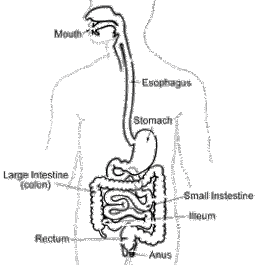Crohns reversiable with diet
Diabetes is reversible with diet changes & lifestyle change

The digestive system.mmation in the small intestine. Crohn's disease usually occurs in the lower part of the small intestine, called the ileum, but it can affect any part of the digestive tract, from the mouth to the anus. The inflammation extends deep into the lining of the affected organ. The inflammation can cause pain and can make the intestines empty frequently, resulting in diarrhea.
Crohn's disease is an inflammatory bowel disease (IBD), the general name for diseases that cause inflammation in the intestines. Crohn's disease can be difficult to diagnose because its symptoms are similar to other intestinal disorders such as irritable bowel syndrome and to another type of IBD called ulcerative colitis. Ulcerative colitis causes inflammation and ulcers in the top layer of the lining of the large intestine.
Crohn's disease affects men and women equally and seems to run in some families. About 20 percent of people with Crohn's disease have a blood relative with some form of IBD, most often a brother or sister and sometimes a parent or child.
Crohn's disease may also be called ileitis or enteritis.
What causes Crohn's disease?
Theories about what causes Crohn's disease abound, but none has been proven. The most popular theory is that the body's immune system reacts to a virus or a bacterium by causing ongoing inflammation in the intestine.
People with Crohn's disease tend to have abnormalities of the immune system, but doctors do not know whether these abnormalities are a cause or result of the disease. Crohn's disease is not caused by emotional distress.
What are the symptoms?
The most common symptoms of Crohn's disease are abdominal pain, often in the lower right area, and diarrhea. Rectal bleeding, weight loss, and fever may also occur. Bleeding may be serious and persistent, leading to anemia. Children with Crohn's disease may suffer delayed development and stunted growth.
How is Crohn's disease diagnosed?
A thorough physical exam and a series of tests may be required to diagnose Crohn's disease.
Blood tests may be done to check for anemia, which could indicate bleeding in the intestines. Blood tests may also uncover a high white blood cell count, which is a sign of inflammation somewhere in the body. By testing a stool sample, the doctor can tell if there is bleeding or infection in the intestines.
The doctor may do an upper gastrointestinal (GI) series to look at the small intestine. For this test, the patient drinks barium, a chalky solution that coats the lining of the small intestine, before x rays are taken. The barium shows up white on x-ray film, revealing inflammation or other abnormalities in the intestine.
The doctor may also do a colonoscopy. For this test, the doctor inserts an endoscope--a long, flexible, lighted tube linked to a computer and TV monitor--into the anus to see the inside of the large intestine.
What are the complications of Crohn's disease?
The most common complication is blockage of the intestine. Blockage occurs because the disease tends to thicken the intestinal wall with swelling and scar tissue, narrowing the passage. Crohn's disease may also cause sores, or ulcers, that tunnel through the affected area into surrounding tissues such as the bladder, vagina, or skin. The areas around the anus and rectum are often involved. The tunnels, called fistulas, are a common complication and often become infected. Sometimes fistulas can be treated with medicine, but in some cases they may require surgery.
Nutritional complications are common in Crohn's disease. Deficiencies of proteins, calories, and vitamins are well documented in Crohn's disease. These deficiencies may be caused by inadequate dietary intake, intestinal loss of protein, or poor absorption (malabsorption).
Other complications associated with Crohn's disease include arthritis, skin problems, inflammation in the eyes or mouth, kidney stones, gallstones, or other diseases of the liver and biliary system. Some of these problems resolve during treatment for disease in the digestive system, but some must be treated separately.